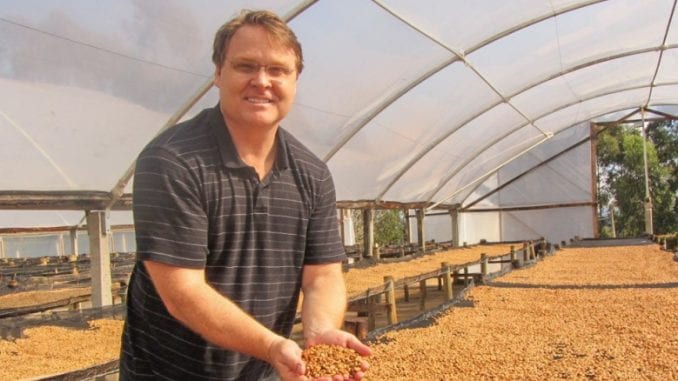
Our conversation with David Griswold continues from the April + May 2018 issue of Barista Magazine.
BY CHRIS RYAN
BARISTA MAGAZINE ONLINE
Cover photo courtesy of Sustainable Harvest Coffee Importers
In the April + May 2018 issue of Barista Magazine, we sat down with Sustainable Harvest Coffee Importers Founder/CEO David Griswold for a “Master Q+A” about his background and how he launched the concept of Relationship Coffee. But we covered much more territory in our lengthy conversation at Sustainable Harvest’s headquarters in Portland, Ore. In this additional excerpt from our interview, David talks about his almost-career in journalism, passing on the value of international travel to his son, and more.
CR: You mentioned you originally wanted to pursue journalism as a career—can you tell me more about that?
DG: When I was 17, I had the opportunity to travel with my parents on Semester at Sea, a shipboard college international travel program. One of the classes I audited was a journalism class taught by Henry Gemmill, former managing editor of the Wall Street Journal. I learned so much from him and was really fascinated with journalism as a topic. I became really focused on journalism when I returned to the U.S.
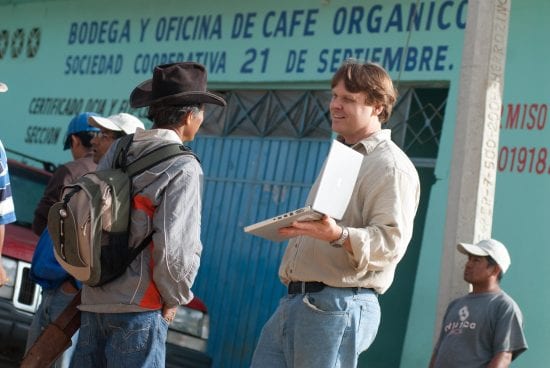
The most interesting journalism experience I had was winning the Thomas J. Watson Fellowship. The structure of the Watson encourages independence and creative problem-solving. The fellowship provides fellows with enough money to travel for a year, but it also requires that you not return home for over a year, and that you refrain from joining any formal educational or university program. This forces you to basically create your own learning journey. So I had to pick a topic I was truly invested in.
I had spent time living with Olympic athletes during my junior year in college in Madrid, and so I decided to study and write about athletes in the developing world. I wanted to figure out why developing countries were so interested in creating Olympic-caliber athletes, what drove it from the political and social side, and what the best programs were. I had also worked as an Awards and Ceremonies Page at the 1984 L.A. Olympics, raising the winning countries’ flags at the different Olympic events, so elite athletics were a specific area of interest for me.
It was fascinating to travel for the fellowship throughout Latin America and Africa, but I began to realize that journalism was going to be a difficult career for me. I found that I could get so absorbed in a topic that it was hard to step back and write about it. During my travels, I also started to witness the inefficiency of development programs in so many of these countries, and so my focus started to shift from journalism to international development.
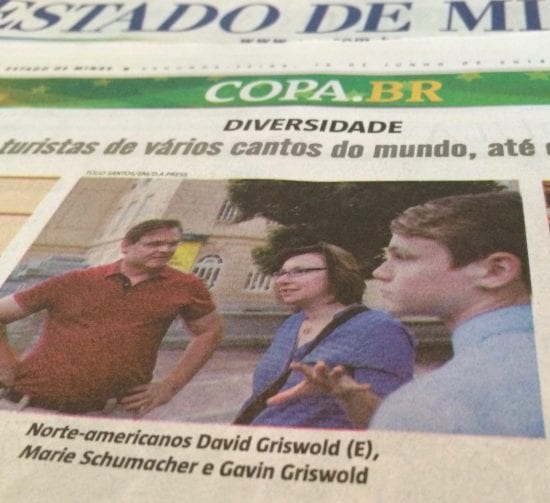
CR: You mentioned that traveling internationally at a young age—through Semester at Sea and other opportunities—had a big influence on your world view. Have you been able to take your son on trips as well?
DG: Yes. Gavin is 17 now, but when he was about 8 years old we started taking him on coffee trips during his spring breaks and in the summer. He’s been to a number of producing countries in Latin America, as well as to Europe, Rwanda, and Australia. He was occasionally bored during those trips, but I think it was important for him to see the kind of work that his dad and his colleagues were trying to do, and to see different parts of the world he wouldn’t have otherwise been exposed to. And I think those things sunk in—when I talk to his high school teachers, they say he has a broad perspective on international issues. I recommend it as a parent. I think you learn so much from leaving the U.S. and experiencing other cultures, especially with the opportunity to go beyond the lens of tourism and observe business and development in progress.
CR: You started the Let’s Talk Coffee conference in 2003 as a way to bring roasters and farmers together; it’s been a regular event since then, and you’ll hold the next event in September. What do you think has made Let’s Talk Coffee successful?
DG: I think it’s because Let’s Talk Coffee is a way to bring the Relationship Coffee concept to life. It is an event where all the stakeholders meet and learn from one another, conduct business, and get professional training. As human beings we need a time of connection face to face. We also need to grow personally and professionally. And most of us need practical business reasons to justify going to an international conference. I believe we’ve been able to provide that at Let’s Talk Coffee and also make it a time for celebration—we work together, we enjoy time together, and we have fun together.
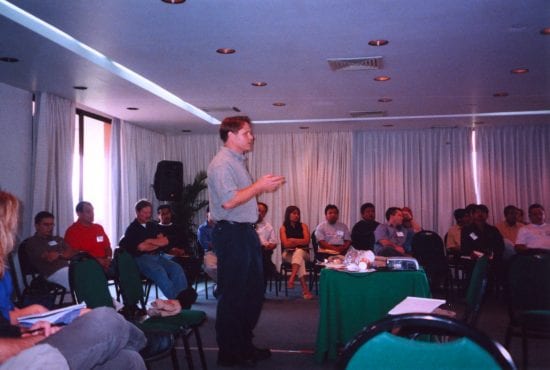
CR: Sustainable Harvest founded the Relationship Coffee Institute—recently renamed Sustainable Growers—with Bloomberg Philanthropies in 2013 to work with women farmers in Rwanda. You’ve mentioned that you learned lessons through this work that you applied to other producer origins. Can you give me an example of one of those lessons?
DG: Michael Bloomberg really pushed for us to think of government as one of the stakeholders that needs to be brought in to create productive development, as they have the ability to scale. As a generalization, businesspeople sometimes view government more as a tax collector, rather than a contributing stakeholder in economic development. Our experience in Rwanda has shifted our perspective. Now we think of our work as a civic enterprise rather than a social enterprise. For the upcoming Let’s Talk Coffee event in Colombia, we’re partnering with the government there to make the event better. And we wouldn’t have thought to work in partnership with government entities if we hadn’t done so with the Sustainable Growers foundation.
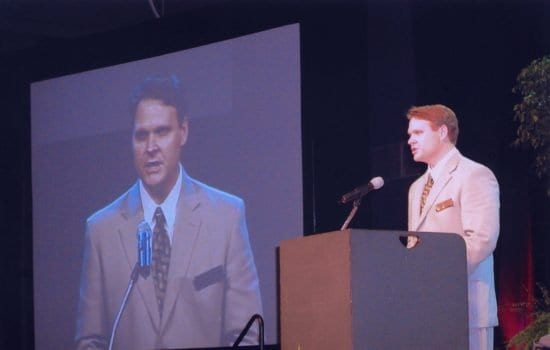
CR: Sustainable Harvest was the first coffee importer to become a Certified B Corporation, a designation for businesses committed to being a force for good. How did that happen?
DG: I’ve always been troubled by the idea in U.S. capitalism that publicly traded companies have to often dismiss the long-term impact of their purchasing decisions simply because of their legal obligation to maximize profits for the benefit of their shareholders. In 2007, I happened to see [B Corp co-founder] Bart Houlahan speak at an event at the Benson Hotel in Portland, when B Corp was just getting started. So many of the things he said resonated with me, such as companies changing their articles of incorporation so that they communicate that as a company they will make decisions based on all stakeholders, not just the interest of the shareholders. I ran up to Bart after he finished and said, “I’ve been looking for this kind of solution, and I want to be one of the first coffee B Corporations.” We’ve been closely tied to them ever since, and I continue to tell other people about the B Corp concept. I think it’s so important that companies have some rigor around their social responsibility, and B Corp provides that.
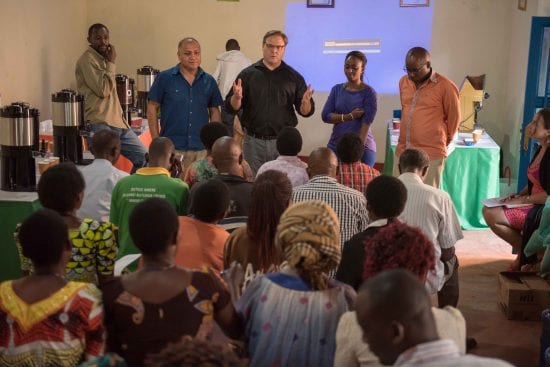
CR: Sustainable Harvest has been a company for over 20 years now—what’s exciting to you about the future?
DG: I’m excited to see what our coffee community continues to do as far as innovating and using technology to help farmers—and for us to play a part in that. While there used to be very little interaction between roasters and farmers, now there are so many innovative ways to use social media and other technology to keep all members of the coffee community connected and included in professional conversations and activity. It’s inspiring to see so many companies starting to work in this field.
Additionally, I think one of the next stages for me is working with other industries to help them build collaborative supply chains that are transparent, just, and empathetic—whether it’s in textiles, artisan works, or other commodities. I’m having many conversations about applying the Relationship Coffee Model to other industries, and I’m really excited about exploring that and seeing what happens.

